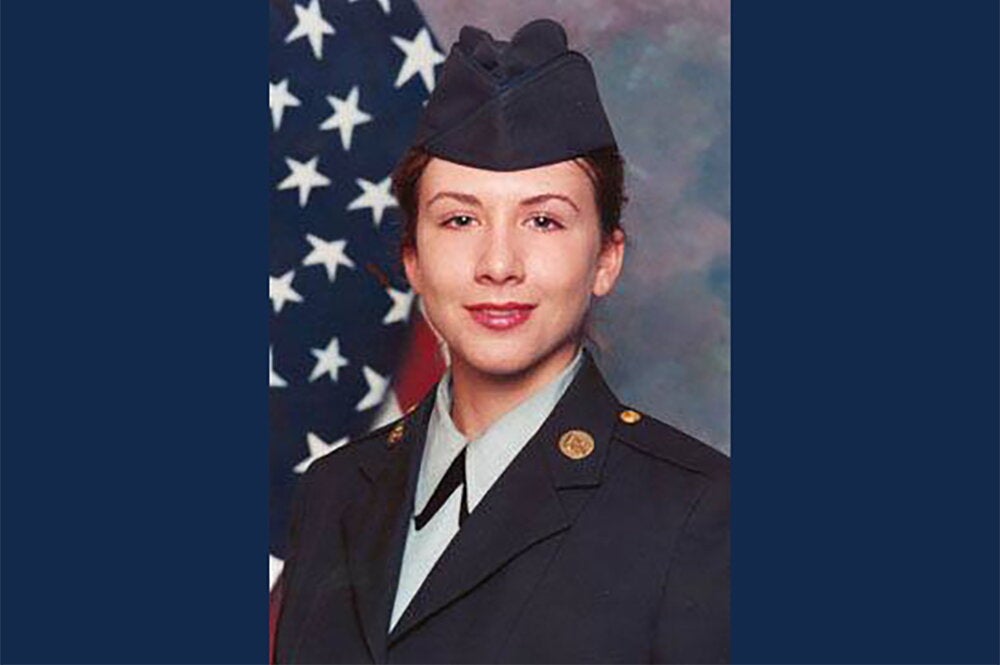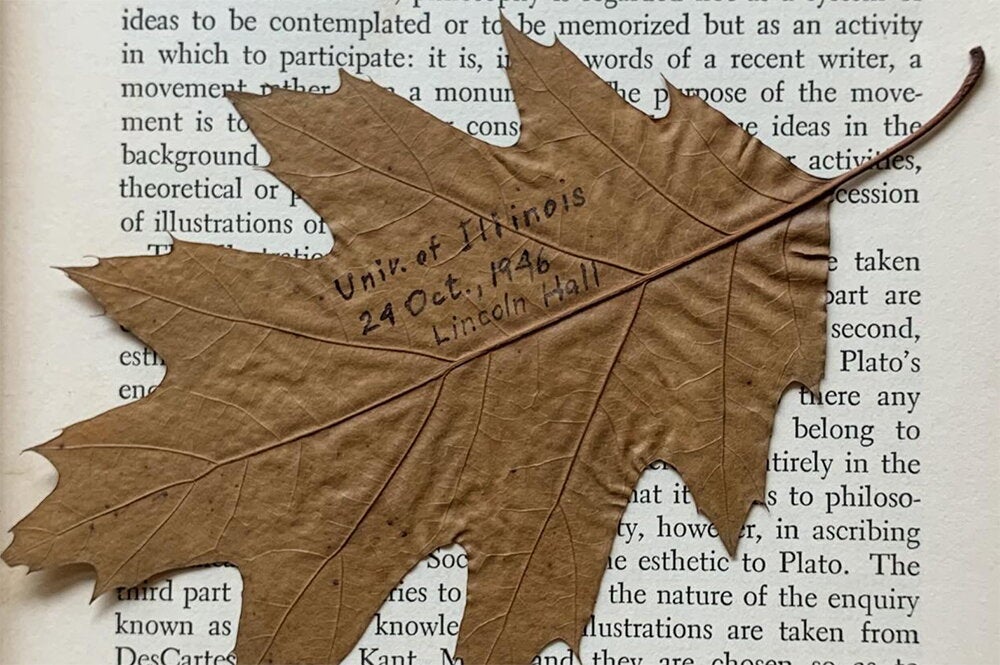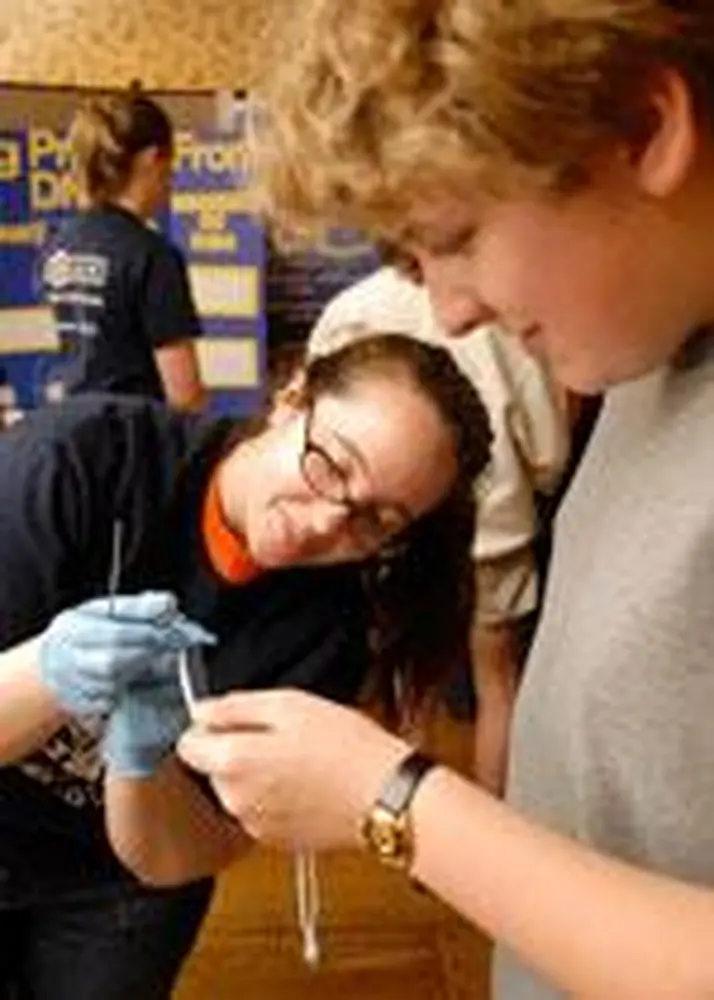
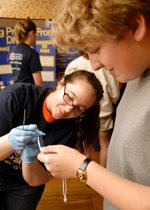
DNA necklaces were de rigueur at this spring's School of Molecular and Cellular Biology's (MCB) open house. You could get one by swishing a dash of Gatorade around your cheeks for 30 seconds, and then spitting it out into a solution of dish soap and ethanol. What emerged was a three-layered concoction: ethanol on top, Gatorade and dish soap solution on the bottom, and a tiny, white speck of DNA in the middle. The DNA was then carefully scooped out and placed in a plastic vial attached to a string. Stephanie DeFlorio, an MCB major, did the scooping. Her own necklace displayed a very visible dot of DNA. "Mine is bigger because I tend to bite my cheeks," DeFlorio says, smiling.
Held upstairs in the Illini Union, the daylong interactive open house showcased ongoing activities by MCB majors. The student-run group LIGASE was one of the sponsors. The six-lettered acronym stands for Linking Illini with a General Appreciation for Science in the Environment. Scientifically, LIGASE is an enzyme that links together gaps in the DNA backbone.
LIGASE members-in T-shirts that advised to "Think inside the cell"-stood at the ready to discuss how lungs and stem cells work, to explain fluorescent microscopy, electrophoresis, butterfly genetics, or epidemiology. They could probably even recite a definition of MCB: "Molecular and Cellular Biology, or MCB, is the study that focuses on the structure of living organisms, the way they work, and why they work that way."
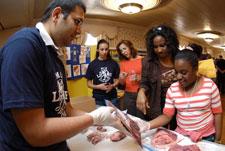
Curious crowds moved among booths with titles such as "Can You Speak in mRNA?," "Roadmap of Protein Synthesis," and "Make Your Own GMO." Kids flocked to the Crime Scene Investigation Interactive Crime Lab, an area set off by yellow tape. Their evidence? Bubblegum left by the culprit.
At the Plaque Adult Interactive Corner, MCB senior Jamie Hofmeister explained the dangers of Bacterial Endocarditis, an infection in the inner heart valve's lining caused by bacterial present in teeth, while trying to entice volunteers to swab their teeth with a toothpick. "This is my way of showing biology through dentistry. I was also curious as to what kind of bacteria was in plaque." Not surprisingly perhaps, Hofmeister will attend UIC's College of Dentistry next fall.
Pooja Patel, an MCB junior who took to science when she received her first chemistry kit, stood in front of the "Take Home a Cell" exhibit handing out various candies that loosely resembled parts of a cell. Red licorice was "cytoskeletal elements." Sour gummy worms stood in for "rough endoplasmic reticulum," not to be confused with regular gummy worms, or "smooth endoplasmic reticulum." Between delegations of sugar-hungry future MCB students, Patel says, "I am amazed at how knowledgeable some of the kids are. Some already know these terms!"
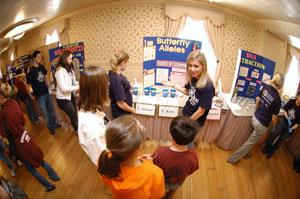
Planarians were also a big hit. The tiny freshwater worms have incredible regenerative capacities. Sever a limb (or head!) and either part grows back in a week. Petri dishes and microscopes documented each phase of the transformation. Diana Zychowski, a junior with a double major in MCB and mathematics who conducts research at U of I's Newmark Lab, says planarians have tremendous potential.
"What excites me is the amazing potential for clinical research. How this work can be adapted for human research and, someday, maybe help paralysis victims. Planarians have what we don't: incredible regenerative abilities."
Earlier in the week, LIGASE president and MCB junior Kaitrin Baloue said the three-year-old club keeps faculty and administration connected with the thousands of MCB majors.
"Because of the large number of MCB students, it's very easy to get lost and to feel like no one really cares about what you're doing. And I'd like students to know that's not true. That's been a very central part of what LIGASE has been trying to do.
"We provide lots of opportunities, and lots of ways for MCB students to get involved. We provide peer tutoring, group tutoring, and peer advising. We have the MCB Undergraduate Council that meets with administration and faculty. We also feature monthly seminars and we just started a mentoring program with the Illini Biological Society."
Although LIGASE is open to all MCB students, Baloue admits that it helps to be a "bio nerd." When asked to define the term, Baloue laughs.
"A bio nerd is me. I love science and I think learning about DNA and learning about how the body works is really cool. And nerdy things like polymerase chain reaction, which is a form of amplifying DNA. There's this enzyme that you use in doing this-thermos aquaticus. When I learned about it I thought it was the coolest name ever. I thought I have to name my kid thermos aquaticus!"

